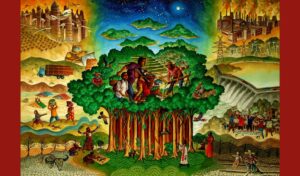IDS Researcher Ian Scoones has co-edited a new open access book titled Climate Change and Critical Agrarian Studies. It explores the effects of climate change and responses to it on the rural world, including contributions from scholars of critical agrarian studies from around the globe.

The United Nations’ COP28 conference on climate change this month in Dubai has brought renewed attention to questions over food and land. For many areas, climate change involves disrupted weather patterns, as well as changes to seasons and conditions for growing crops and rearing animals. For people in the countryside, these impacts come on top of social inequalities and the pressures of globalisation and industrialisation of food systems.
Meanwhile, countries around the world are under pressure to reform food and land to mitigate or adapt to climate change. The Paris Agreement adopted in 2015 commits governments to pursue efforts to limit global temperature rise to 1.5 degrees above pre-industrial levels. But every year, carbon emissions continue to rise rapidly, increasing the political pressure for ever more dramatic and radical changes on shorter timescales.
Adapting to the existing and projected effects of climate change also involves hard choices, given the unpredictability of climate impacts on particular places, and the uncertain consequences of many technical fixes or new social arrangements. The climate also intersects with many other forces, from historical inequalities and conflicts to other drivers of ecological change. Rural areas are often the sites of schemes that aim to ‘solve’ or address climate change, shaped by the demands of capitalism and state interests, but the people most affected often have little say on how these projects are designed or carried out.
Transitions to low-carbon industries
Rural areas dominated by the coal industry now face uncertain ‘transitions’ to lower-carbon industries. Technological and ‘nature-based’ solutions, including climate-smart agriculture, conservation projects, carbon offsetting schemes and carbon sequestration in forests, create new markets and interests. And new energy regimes, driving construction of solar parks and mining for renewables and battery storage, create new competition over land and space. In the past year, high profile media coverage has cast doubt over the benefits of carbon offsetting schemes, and struggles over industrial projects in forests, mountains and rangelands continue around the world.
In this context, agrarian struggles, led by peasants, pastoralists, fisherfolk, rural workers and others, are highly relevant to the discussions at the COP28 conference. Timed to coincide with COP28, the book Climate Change and Critical Agrarian Studies is co-edited by IDS professorial fellow Ian Scoones, and includes 26 chapters previously published in the Journal of Peasant Studies. The book brings a critical agrarian lens to issues that deserve urgent attention as policy makers negotiate over future action for the climate.
About the book
Climate change is perhaps the greatest threat to humanity today and plays out as a cruel engine of myriad forms of injustice, violence and destruction. The effects of climate change from human-made emissions of greenhouse gases are devastating and accelerating; yet are uncertain and uneven both in terms of geography and socio-economic impacts. Emerging from the dynamics of capitalism since the industrial revolution — as well as industrialisation under state-led socialism — the consequences of climate change are especially profound for the countryside and its inhabitants.
The book interrogates the narratives and strategies that frame climate change and examines the institutionalised responses in agrarian settings, highlighting what exclusions and inclusions result. It explores how different people — in relation to class and other co-constituted axes of social difference such as gender, race, ethnicity, age and occupation — are affected by climate change, as well as the climate adaptation and mitigation responses being implemented in rural areas. The book in turn explores how climate change – and the responses to it – affect processes of social differentiation, trajectories of accumulation and in turn agrarian politics. Finally, the book examines what strategies are required to confront climate change, and the underlying political-economic dynamics that cause it, reflecting on what this means for agrarian struggles across the world.
The 26 chapters in this volume explore how the relationship between capitalism and climate change plays out in the rural world and, in particular, the way agrarian struggles connect with the huge challenge of climate change. Through a huge variety of case studies alongside more conceptual chapters, the book makes the often-missing connection between climate change and critical agrarian studies. The book argues that making the connection between climate and agrarian justice is crucial.
